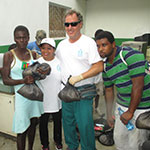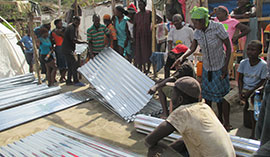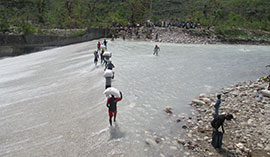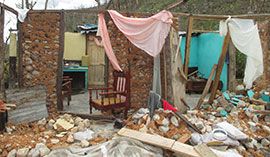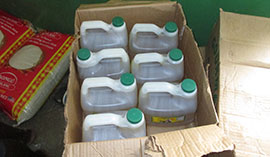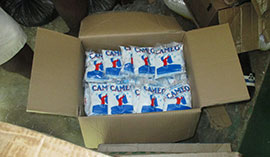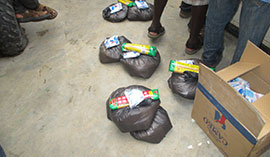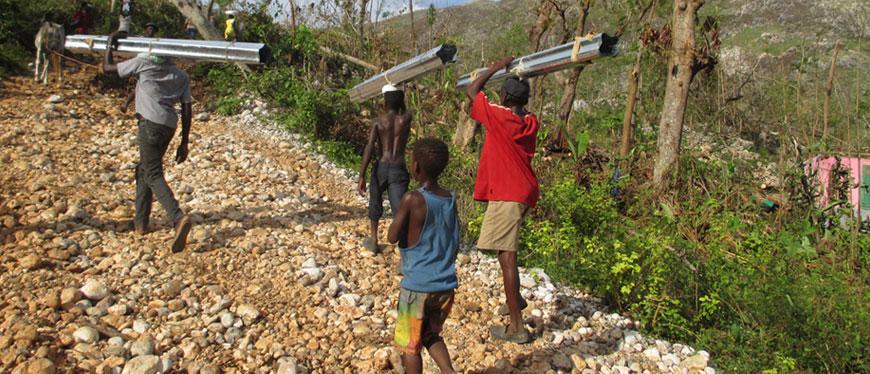
Upon seeing the reports of the widespread disaster that occurred in the southwest region of Haiti, we decided to embark upon disaster relief on an urgent basis. Our team consisted of myself, my wife, Wislene Etienne a nursing assistant, and Dominique Louis, President of the Green Children's House Foundation, a colleague of mine in prior Haiti trips. We received medical supplies from local donors as well as from Americares Foundation and from Blessing International Charity. The Boca Raton Regional Hospital contributed intravenous supplies, intravenous medicines and some other needed gloves and masks for this trip. We flew into the capital city of Port au Prince where we met up with the rest of our team. We had four police officers for security, Dr. Michel Brutus, our local Haitian physician and partner, along with his pharmacist, 2 pharmacy aids, a surgeon, and 2 medical internists.
We drove out to the disaster zone after picking up supplies at Food for the Poor Charity, which included multiple bags of rice, beans, sorgham, as well as bringing our own supplies of water and medicines. The first day in Paillant, we delivered food to 500 families, provided medical checkups for more than 200 people, most of whom were affected one way or the other by the hurricane. The following day we went out to a small village Frond des Bouquet where we again had checkups and delivered much-needed emergency food rations and medical care.
The final day we reached Les Cayes the epicenter of the disaster. On the Route, we noted complete devastation of many of the homes as well as destruction of the electrical system of the community, and water flood damage throughout. Early the following morning, the convoy drove out to Le Pretre, a small village along a mountain river, which was quite remote. It required a nearly two-hour ride on a rough dirt road, where we reached a rapidly flowing river and departed from our vehicles. All persons had to cross the river which was a dangerous activity, and all our supplies had to be ported on top of the heads of strong necked Haitians .On the other side of the river, a small motor scooter transported us several miles more to the village itself. We noted that the village was 90% destroyed by the hurricane's gale force winds. We set up our medical clinic at the abandoned clinic site, where the last nurse was there more than 10 years before. We delivered medical care,minor surgical care and wound care, as well as much-needed rice and beans to the hungry people there. We saw multiple cases of trauma from the hurricane, where we had crush injuries and severe wounds related to houses falling on top of people, or trees falling on top of people. The desperation there was palpable.
Upon return to the capital city, Dr. Brutus will be speaking to the Haitian Ministry of Health to try to obtain a physician and nurse sponsored by the Haitian government to fill this clinic site and start providing ongoing and continuous medical care for the local population. In addition, he wants to set up a feeding station for malnutrition. This will be a partnership between HELP Charity NGO in Haiti and our charity here in United States. In addition, we have sent $5000 provided by the Eisenbergs, which is being used for construction materials; such as roofing supplies - mostly aluminum sheets for roofing, as well as additional bags of rice and beans that had been promised by Food for the Poor but not able to be delivered in the first shipments.
In conclusion, the area was devastated by this hurricane Matthew. The needs are great and ongoing. We have a local partnership with Dr. Michel Brutus and his Charity HELP whereby we could work within the Ministry of Health in order to provide continuous ongoing care for the local population. Our commitments to Haiti continue; and I hope the board and those reading this will be inspired to help maintain these commitments through both financial and other forms of support as needed by the unfortunate victims of Haiti's physical disasters as well as their widespread poverty which often prevents any successful recovery.


